Are you planning to build your own online store? Are you looking for a reliable platform to migrate your existing store? Or do you want to challenge yourself with a diverse and potential eCommerce platform? If so, this Magento vs Sylius comparison article is for you!
Magento vs Sylius are the two most popular open-source eCommerce platforms that a newcomer to the field should consider. Each of these platforms offers a unique set of features and capabilities.
Which choice is appropriate will depend on the needs and type of project of the business. In this article, we will analyze the strengths, weaknesses, and suitable audiences for each platform.
Stay tuned!
Magento vs Sylius: The Battle Overview
Table of Contents
Magento Overview
Magento was founded in 2008. This open source e-commerce platform uses the PHP language and is based on the Zend Framework. With a target customer base of businesses and enterprises, Magento always aims for comprehensiveness and perfection in terms of features and operations.
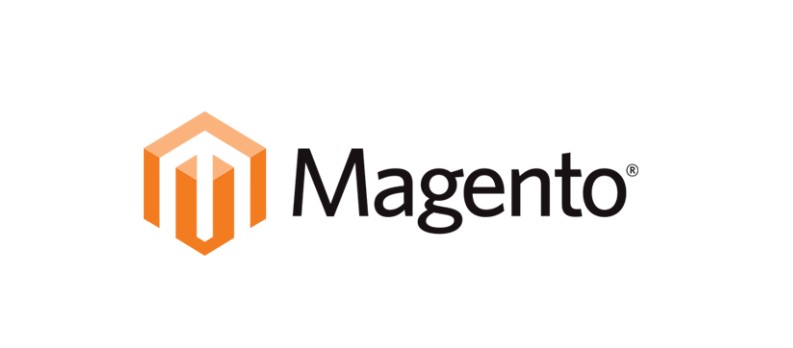
Version 1 of Magento was released first with basic functions to create and manage an online store. By 2015, Magento 2 was launched, designed with technology and a comprehensive new perspective for the eCommerce industry. This open-source platform is dynamically scalable and perfect for creating personalized experiences for both B2B & B2C. Magento source code uses the PHP language and relies on the Zend Framework platform to operate. Currently, there are two commonly used versions of Magento: Community Edition (CE), which is a free version, and Enterprise Edition (EE), which is a paid version.
Sylius Overview
Sylius was launched in 2011, a platform written based on the Symfony framework, providing a headless solution (separating frontend – backend) for mid-sized businesses, with specific products and different business methods. Sylius vs Magento 2′ flexible, component-based architecture is the ideal solution for businesses looking to build unique online stores and custom marketplaces.
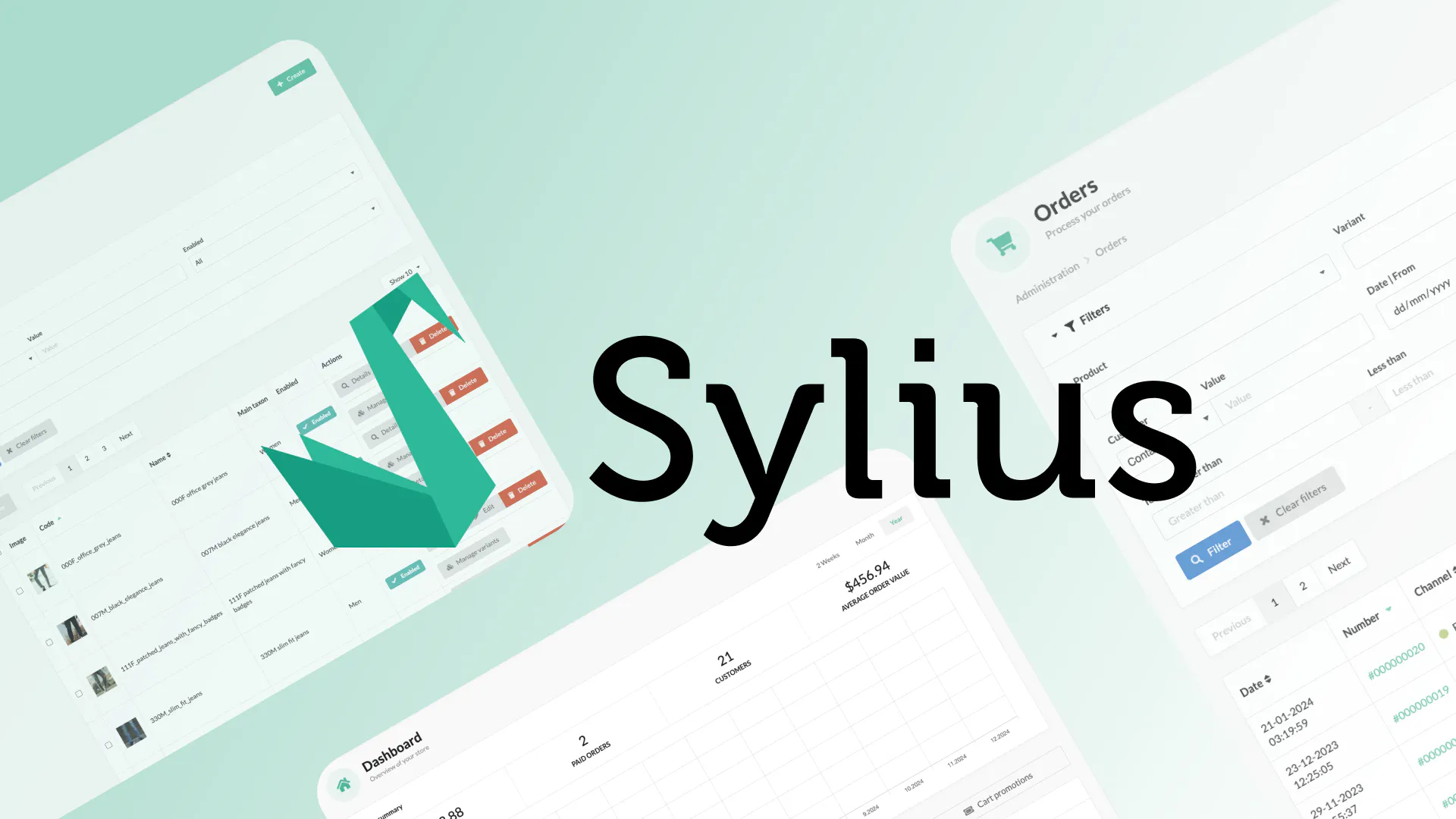
Sylius allows developers to customize every aspect of the shopping experience. From product catalog, payment process to promotions and loyalty programs, this platform has you covered.
If you are looking for a platform with unlimited customization and scalability, Sylius could be the platform to help your eCommerce success.
Sylius vs Magento 2 General Comparison
| Magento (Adobe Commerce) | Sylius | |
| User licenses | Open-source code with 2 versions: community and enterprise (enterprise – annual fee) | Open-source code |
| Flexibility | Easily customize features, thanks to a diverse plugin system (auxiliary functions) and a widespread developer community.
However, customization requires high programming skills and is sometimes quite complicated if the product or business model (way of purchasing, pricing, shipping) is too specific. |
Easily customize features, thanks to compact code organization.
Based on Symfony, everything can be flexibly changed (how to build information structures, forms, controllers, services, etc.) depending on the different broad and narrow needs of the business. Programmers can also separate the interface to integrate code from other platforms: VueJS, ReactJS or Angular. |
| Speed & Performance | Because the system is comprehensive and has many features, it is quite heavy on code structure and requires in-depth technical speed optimization. However, Magento is talented in handling large traffic volumes quickly. | The loading and processing speed of Sylius is fast and efficient, because the programmer manages the entire data design, avoiding redundancy – a characteristic inherited from Symfony’s efficiency, lightness and speed. |
| User interface | The management interface covers many issues. The admin can easily manage the store from a centralized dashboard. | The administration interface is intuitive, concise and focuses on the most necessary user needs. |
| Auxiliary features | Huge store of auxiliary features (free or paid plugins) for a variety of business needs. | A limited number of quality auxiliary feature plugins. |
| Programming community & support | Supported by the IT industry giant Adobe, Magento also receives contributions from a large community of programmers around the world. Bugs or security features are regularly detected, updated and patches created. | A smaller but extremely active developer community contributes to building the platform. Sylius partners also receive support from the official development team. |
| Certification & code compliance | Adobe Commerce (Magento) has security certifications and regular updates to meet industry security criteria, such as PCU DSS for online payments. | Sylius does not have diverse certification systems like Magento. |
| Target audience | Many types of businesses with different sizes can leverage Magento. This platform is suitable for developing diverse and comprehensive features. | Mid-size businesses can utilize Sylius if they are looking for a solution that is flexible and highly customizable according to specific features. This platform is worth considering for those already familiar with Symfony. |
Magento vs Sylius: The Detailed Comparison
Target Audience
For large enterprises with intricate eCommerce requirements that demand strong functionality, great scalability, and enterprise-grade security, Magento is the best option. This is because it is appropriate for large-scale enterprises and can efficiently manage high volumes of traffic and transactions.
Additionally, if your company follows an omnichannel approach, you can benefit from multi-channel integration capabilities with payment, ERP, and CRM systems, among other systems. These integrations will help your company efficiently handle sales operations across various channels. For installation, operation, and maintenance, you will probably want a specialist technical team to operate it effectively.
However, Sylius encourages adaptability and has strong customization options, enabling companies to customize the system to meet unique business requirements. This will fulfil the needs of companies looking to give their customers a customized purchasing experience, assisting them in boosting conversion rates and drawing in repeat business.
In addition, Sylius has an API-first architecture that is appropriate for companies looking to create a headless eCommerce model that divides the front and back ends. As a result, Sylius is more affordable to build and run than Magento, making it a good choice for startups and small- to medium-sized businesses with limited funding. To make intricate changes, you will still need to be tech-savvy or have a development team with that knowledge.
User-Friendliness
For novices, the Magento admin interface can be challenging because it requires specific technical knowledge to use. In addition, Magento requires technical know-how to configure and manage, making it a more difficult process to install and run than Sylius. In particular, you will need to arm yourself with a good deal of programming knowledge if you wish to take advantage of Magento’s extensive customization possibilities.
This complexity can be overwhelming for beginners, but you can simplify your Magento experience with the help of the Magento plugins store. These tools are designed to streamline setup, enhance features, and optimize usability, enabling even novices to manage their online store effectively.
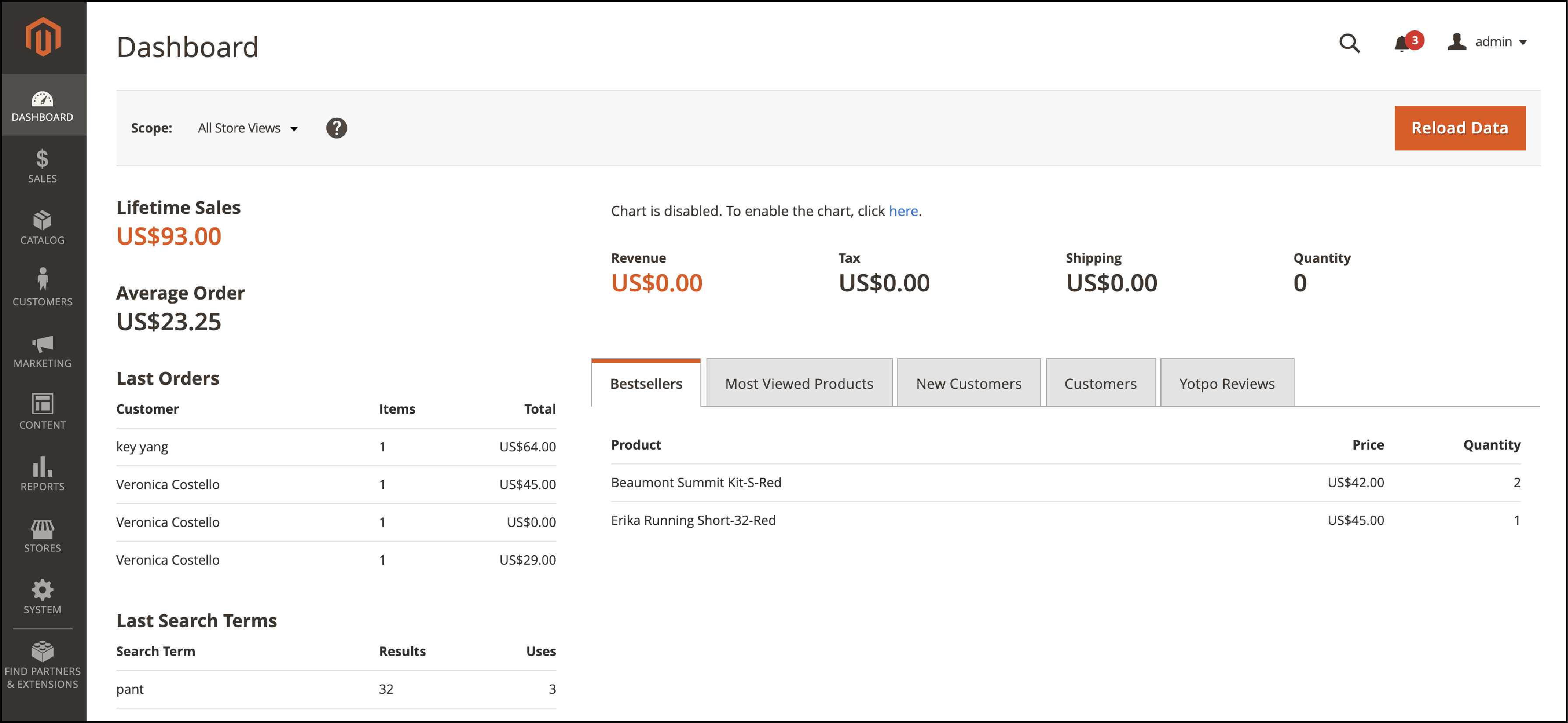
Aside from that, Sylius’s administrative interface is more user-friendly and intuitive than Magento’s, making it possible for even non-expert users to install and run the system with lots of online help and documentation. Technical expertise, however, will also be essential if you choose to carry out intricate alterations.
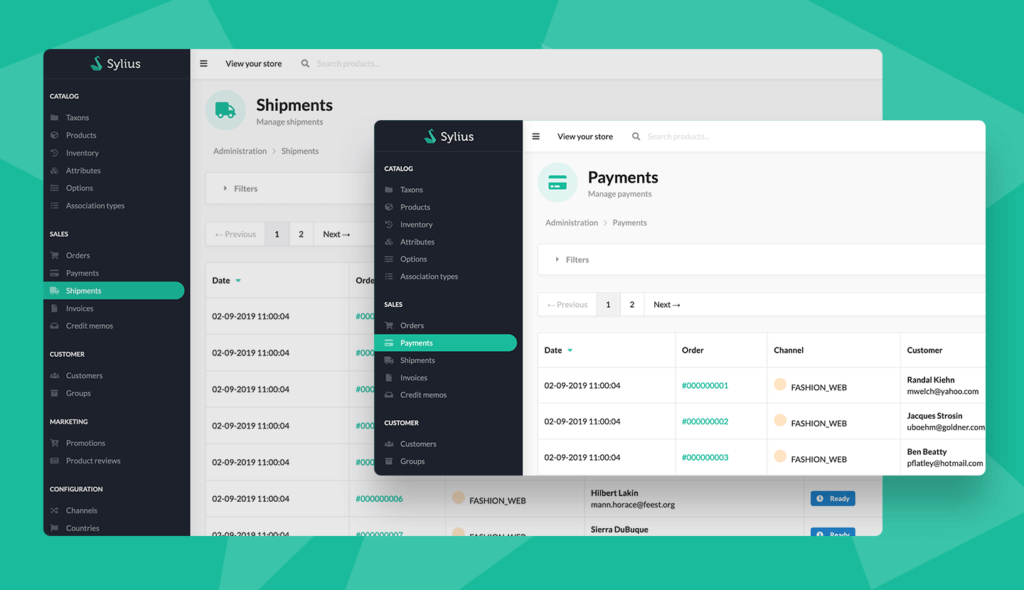
The needs and technological skills of your company will determine which platform is best. Magento can be a viable option for businesses with dedicated technical teams who wish to use its robust feature set and scalability. Businesses can pick Sylius because of its user-friendly interface and low learning curve, especially those with limited resources or those that like to concentrate on customization and flexibility.
Pricing
Magento offers a variety of pricing packages depending on customer needs. For Magento Commerce, your fees will be calculated based on monthly transaction volume on the cloud solution. In contrast, Magento’s open-source, self-hosted solution is completely free but the system will require costs for hosting, infrastructure, and maintenance. Installing, configuring, and customizing Magento to fit your business needs may also incur additional unforeseen costs.
However, you can optimize costs by performing the installation and configuration of Magento yourself if you have the technical knowledge and using free or low-cost templates instead of designing a custom theme.
The story of Sylius is remarkably comparable. It is an entirely free open-source platform, thus getting started is cost-free. But eventually, the expenses of setup, adjustment, and personalization to meet your company’s requirements may result in extra charges. Interface design, plugin and extension costs, maintenance costs, testing costs, software upgrades, and technical support are some of the expenditures mentioned above that could be incurred.
All things considered, starting a business on Sylius is less expensive than on Magento. Magento will, nevertheless, be a safer and more complete option if you’re searching for a synchronous, lifetime setup solution even after your store has expanded.
eCommerce Features
Magento’s Features
As a platform built specifically for eCommerce, Magento is famous for its comprehensive set of eCommerce features that meet all business needs.
For product management features, you can easily add, edit, and delete products easily. Regarding management, you can manage categories, properties, and inventory from the store dashboard, as well as view, track, and process orders throughout the shipping and payment process.
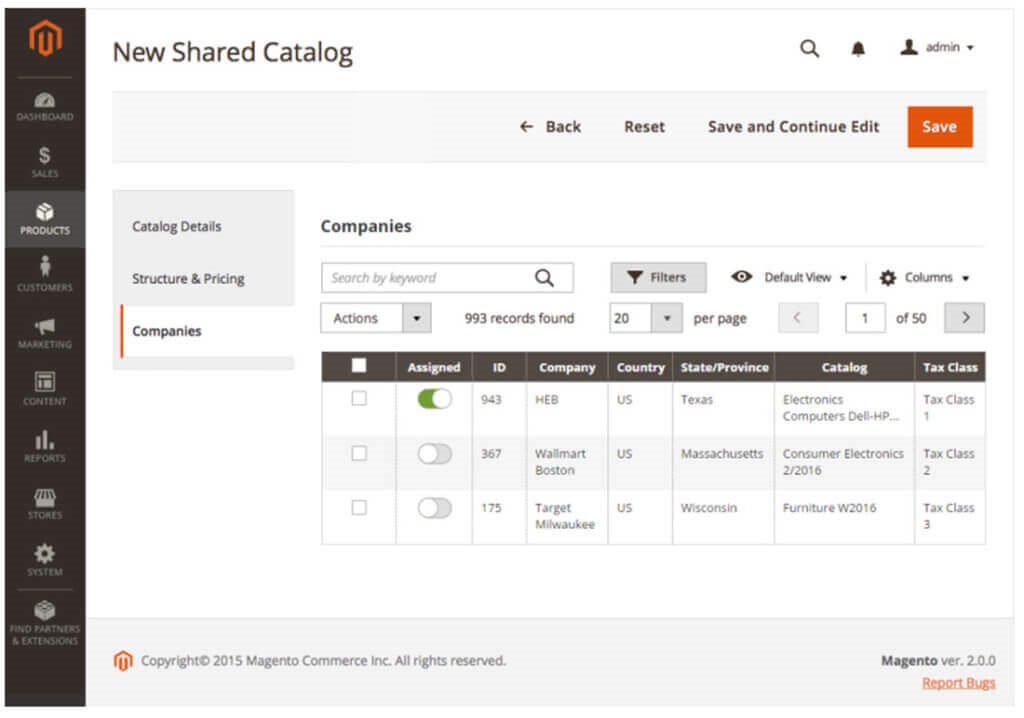
In addition, Magento also provides ancillary features that enhance store functionality, such as marketing, security, and advanced sales features. With advanced sales features, Magento supports business owners with multi-channel sales, selling by product groups (bundles), or related products thanks to the product recommendation mechanism.
Sylius’s Features
As an open-source platform, Sylius has also tried to focus on the core features of eCommerce, while being flexible enough to customize according to needs.
This platform also possesses the basic set of features of an eCommerce store such as: easily adding, editing, and deleting products, and managing categories, properties, and inventory in the dashboard. For other operations, Sylius offers the function of viewing, tracking, and processing orders throughout the shipping and payment process.

However, Sylius’s sales features, such as a shopping cart and online payment, are only at a basic level, as well as other additional features. With the advantage of open-source code, you can also customize it according to specific business needs.
Themes
Magento Themes
Magento has a huge theme warehouse with thousands of free and paid themes from many different providers. These themes will all have features such as responsive design suitable for all devices, easy interface customization through the admin interface, and SEO optimized for search engines.
In addition, certain themes can also be compatible with many extensions and support multi-language and multi-currency. Magento’s free themes can also give you many options depending on the field you are doing business in, such as fashion, electronics, household, and food.
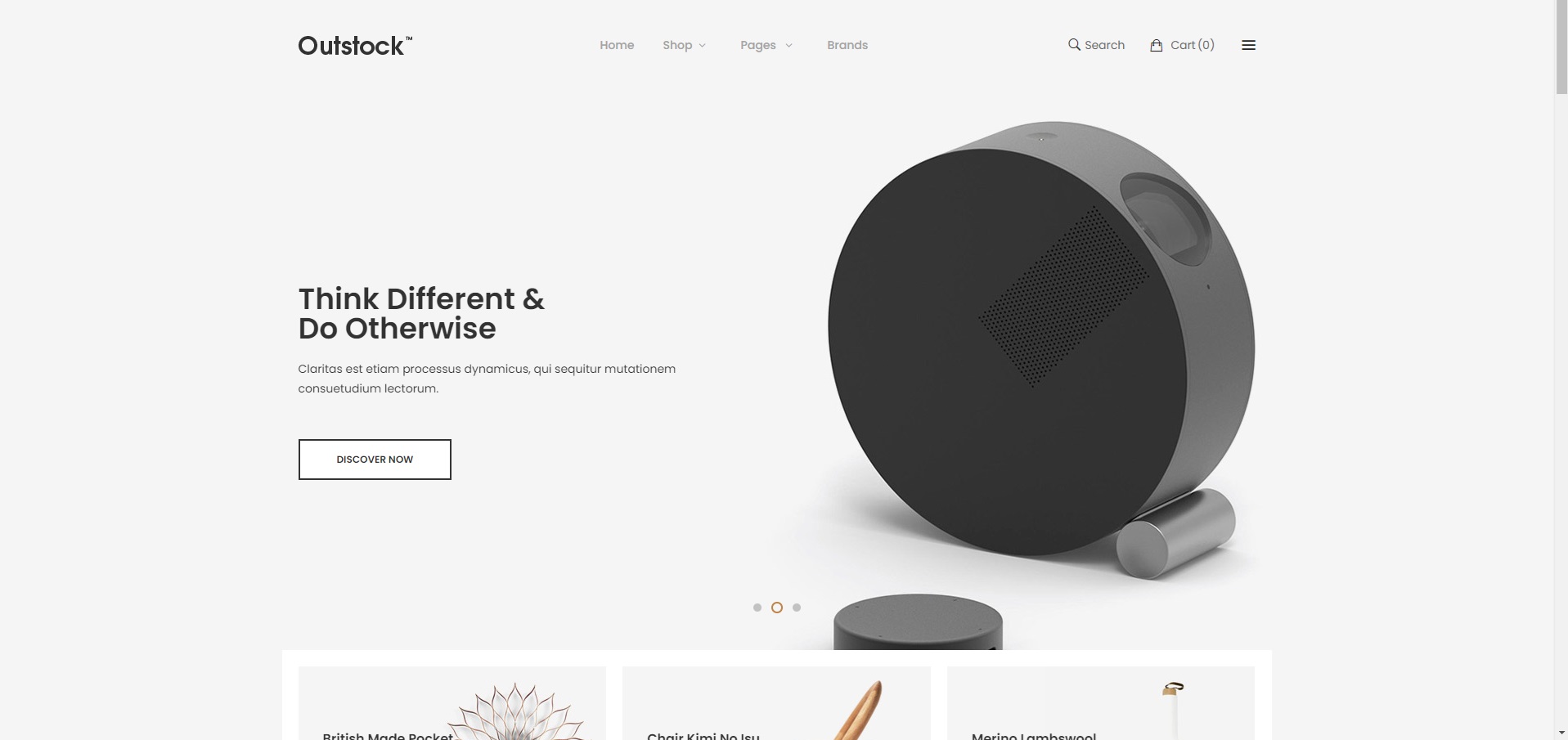
Sylius Themes
Compared to Magento, Sylius has a smaller theme store with only a few hundred free and paid themes. However, these themes also fully meet the important criteria of themes such as responsive design suitable for all devices, customization in the admin interface, and SEO optimization.
If you are looking for some free options for your Sylius store, you can consider a few themes like Sylius Default Theme (simple and modern), and Shopware PWA Theme (increases page loading speed and user experience), Bootstrap 4 Theme (using the Bootstrap 4 framework).
Both Sylius vs Magento 2 provide themes with many useful features for designing and building online stores. However, Magento has a richer theme store with many diverse options, suitable for businesses that want more options. Sylius is suitable for businesses that value flexibility and want the freedom to customize the theme according to their own needs.

Marketing
Marketing Features of Magento
Magento provides robust SEO tools to optimize product descriptions, meta tags, and URLs for search engines. Furthermore, Magento’s CMS easily allows the creation and management of landing pages, blog posts, and other marketing content. If you thrive in email marketing and social media, you can also integrate your store with popular email marketing platforms for automated campaigns, targeted promotions, and product and promotion sharing.
Not to mention, Magento itself also provides enhanced SEO leads to more organic traffic and higher conversion rates.
Marketing Features of Sylius
Unlike Magento, Sylius only offers a basic content management system (CMS) for creating and arranging blog posts and product descriptions, as well as some limited SEO features for optimizing product titles and descriptions.
Sylius can be coupled with third-party email marketing platforms to facilitate automated campaigns and consumer segmentation. In order to enhance cross- and up-selling, Sylius also offers a basic purchase history-based product suggestion engine.
When it comes to marketing features, Magento wins hands-down. Businesses can efficiently execute complex marketing campaigns, maximize client engagement, and boost sales thanks to its extensive toolkit and cutting-edge capabilities. Although Sylius provides some basic marketing features, it does not offer the same level of complex tools and connectors as Magento.
Security
Magento Security
In the face of online threats, Magento and Sylius both have security mechanisms and features to protect clients as well as vendors.
As for Magento, this platform has built a relatively comprehensive security suite. Users can rest assured when utilizing features such as RBAC, 2FA and PCI DSS. These are prerequisite features to ensure security and accuracy for large-scale eCommerce activities.
That’s why only large businesses with complex structures can leverage these features. Small and medium-sized vendors or companies that do not have a very strict security structure may have difficulty taking advantage of these mechanisms.

Sylius Security
As for Sylius, the platform uses simpler and more mass-marketed security features: ACLs, firewall integration, and input authentication. However, if you are using Sylius, you can continuously improve your security by regularly updating your security policies or using a third-party utility.
Therefore, choosing a platform based on security characteristics between Sylius vs Magento 2 will depend on the scale, nature of the product or security expertise of the development team. However, if you want to scale up your store in the future, preparing a solid, methodical security foundation is indispensable right from the first setup steps.

Add Ons
Magento Add Ons
Magento reigns supreme in the add-on arena, boasting a massive library that caters to nearly every business need. From SEO and inventory management to marketing automation and multi-channel selling, Magento extensions significantly enhance eCommerce functionalities.
Some outstanding Magento plugins store include:
- Ultimate SEO Magento Suite: A comprehensive SEO solution helps improve search rankings and attract more potential customers.
- M2E Pro: Helps manage multiple online sales channels from one interface, synchronizing products, prices, and inventory.
- Advanced Inventory Management: Advanced warehouse management system with detailed tracking, data analysis and reporting features.
>>> Full Review of 20+ Best Magento 2 Extensions for 2024
Sylius Add Ons
Magento can completely beat any eCommerce platform with its huge library of add-ons and extensions. However, Sylius is also trying hard to improve this drawback. Sylius add-ons are lightweight and provide open-source resources for customization and integration.
Some outstanding add-ons of Sylius include:
- SEO: Sylius does not have SEO enhancement specifically for the store, but this platform still optimizes some store components such as meta, sitemap, and breadcrumbs.
- Warehouse: Sylius provides basic warehouse features such as order management, inventory control and other basic reporting and analysis features. However, these supports only stop at the basic level.
- Search and Recommendation: Cross-sell and up-sell is the strategy of any online store. Sylius, like any eCommerce platform, provides search and product suggestion capabilities. However, you will need to add additional extensions to optimize the search capabilities of your store.
- Stock Management: Besides basic inventory management in the reporting feature, Sylius also provides management functions via SKU. You can track the status of the quantity of goods in many stages such as inventory, ordering and shipping.
By carefully evaluating your needs, you can make an informed decision on which platform Magento vs Sylius offers the most suitable add-on ecosystem to fuel your eCommerce success. If you go for extensive functionality & customization, Magento’s vast add-on library provides the tools you need. Otherwise, Sylius’s well-integrated add-ons and open-source nature might be ideal for a streamlined approach & open-source flexibility.
Customizability & Scalability
The Customizability & Scalability of Magento
Magento, renowned for its great degree of customis
ation, enables us to alter the layout and add practical functions. Additionally, Magento permits other parties to integrate source code for various uses. Nearly every aspect of your store can be altered, including the features, checkout procedure, and overall appearance.
High personalization does, however, come with complications. You must have programming skills and experience to configure Magento properly. Not to add, it takes a lot of money and technical resources to upgrade and grow Magento. BSS Commerce might be a dependable option if you’re searching for a partner to help you customize and implement your Magento store.
As a top-notch Magento 2 eCommerce development company, BSS can help you save a lot of time and effort with many outstanding advantages compared to Magento teams in the world:
- Outstanding quality testing team: ISTQB Platinum Partner certified testing team ensures perfect project quality.
- Extensive experience: More than 11 years of successful implementation for major global brands, providing optimal solutions for your business.
- Deep expertise: Understanding the market and diverse business models, meeting all eCommerce needs.
- Reputation and transparency: Committed to providing clear quotes, accurate completion time and transparent project scope.
- High rate of loyal customers: 90% of customers return, proving the service quality and dedication of BSS Commerce.
The Customizability & Scalability of Sylius
If you are skeptical because of Magento’s complexity, you can also consider Sylius’s high customization capabilities to tailor the system to your business needs. Sylius is also highly scalable, making it suitable for small and medium-sized enterprises.
Even while Sylius has more versatile customization options than Magento, complex alterations might still require programming expertise. Not to mention, for big and intricate eCommerce projects, Sylius’s scalability can be less flexible than Magento’s.
Customer Feedback
If you are still wondering about the actual experience, below is some reliable multi-dimensional feedback from stores that have used Magento vs Sylius.
Feedback About Magento
1) Review from an user named Rahul S on G2
Rating: 4/5 star
What do you like best about Adobe Commerce (formerly Magento Commerce)?
The scalability and flexibility of Adobe Commerce (formerly known as Magento Commerce) are its most beneficial features. It offers a configurable framework for building distinctive and individualised online stores and serves businesses of all sizes. The benefits of adopting Adobe Commerce include its rich feature set, easy interaction with other Adobe products, sophisticated analytics and reporting tools, and a wide range of design and branding options. In order to help customers fully utilise the platform, it also provides thorough documentation, training materials, and a welcoming community.
What do you dislike about Adobe Commerce (formerly Magento Commerce)?
Utilising Adobe Commerce (formerly known as Magento Commerce) has certain potential drawbacks, including a steep learning curve. It can take some time for customers to acquire accustomed to its functionalities due to its wide variety of features and customization choices, especially for those who are new to eCommerce platforms. To fully utilise the system’s potential, it might also be necessary to have specialised technical knowledge or resources due to the complexity of the system. To help users overcome these obstacles, Adobe offers documentation, instruction, and a community.
What problems is Adobe Commerce (formerly Magento Commerce) solving and how is that benefiting you?
A robust eCommerce platform called Adobe Commerce (formerly known as Magento Commerce) helps enterprises with a variety of issues, such as:
Scalability: Adobe Commerce is a platform that is scalable and capable of handling high numbers of orders and traffic. This is crucial for companies that are expanding or who anticipate seasonal traffic spikes.
Adaptability: Adobe Commerce is a highly adaptable platform that can be configured to satisfy the unique requirements of any organisation. This is crucial for companies who wish to give their customers a distinctive and varied buying experience.
Integration: Adobe Commerce can be integrated with a wide number of other programmes and platforms, including marketing automation, ERP, and customer relationship management systems. Through all client touchpoints, this enables organisations to create a cohesive customer experience.
Security: Adobe Commerce is a platform that complies with the most recent security requirements. For companies who need to safeguard the information of their clients, this is crucial.
Due to these advantages, Adobe Commerce assists companies in:
-greater sales
-Boost client satisfaction
-Cut expenses
-Acquire a competitive edge
One of our clients, a major sporting goods store, for instance, was able to boost sales by 20% as soon as they switched to Adobe Commerce. By offering a more individualised shopping experience, they were also able to raise client happiness. By automating their order management procedure, they were also able to cut expenditures.
Overall, Adobe Commerce is a strong eCommerce platform that may assist companies in resolving a variety of issues and achieving their objectives.
2) Review from an user named Abhishek D. on G2
Rating: 3/5 star
What do you like best about Magento Open Source?
You can add tons of products, and it will still run seamlessly. Magento is also very SEO-centric. Its page builder, WYSIWYG has some neat features. Magento also has some advanced reporting options available and these keep updating constantly to show the latest metrics.
What do you dislike about Magento Open Source?
Technical support could be better. You will need a dedicated hosting server for swift operation. Shared hosting does not work quite as well. Magento is a little too complex compared to its alternative. There are a lot of premium features available but are not all free to use.
Recommendations to others considering Magento Open Source:
If you are a technically advanced person with good knowledge of WordPress, hosting, and website setup in general, then go for Magento. It also has paid features you can use. It is more secure than WooCommerce in my opinion.
What problems is Magento Open Source solving and how is that benefiting you?
Magento has helped a lot of people including my company to set up an online store and start a business. Our first eCommerce platform was Magento until we made the switch to WooCommerce because of its ease of use.
Feedback About Sylius
1) Review from an user named Yazan J on G2
Rating: 5/5 star
What do you like best about Sylius?
The best features of this application are that it is light, fast, and very understandable for people or companies that want to sell products. Where the customer can understand the settings of this application, most of the users of small business companies that use this application who deal with me do not face any problems learning to adjust the settings.
What do you dislike about Sylius?
Previously, the browser was not free for a limited period for testing because some of its most important features required you to pay to be able to check them. This is something that makes its pioneers very anxious to be convinced to buy it.
Recommendations to others considering Sylius:
This is an advantage that you can invest in creating a website for sale to companies that are middle-income because it is easy to use and uncomplicated.
What problems is Sylius solving and how is that benefiting you?
We have designed a lot of special websites for our clients who have middle-income companies. It is light in navigation, designed and suitable for the needs of clients.
2) Review from an user on Capterra
Rating: 5/5 star
Overall: my experience with Sylius is good however the query response is bad or sometimes even give no answer
Pros: They use Symfony and as I work with that framework that is very helpful for fast learning and implementation of solutions The bundles they use are the most stable and those that have developed are standard to what Symfony uses. They have excellent documentation for the developer and plenty of help channels. They promote the framework very well and help to carry out projects from scratch of an online store My experience is very good and I do not use any other eCommerce solution since I use Sylius, its installation is easy, it uses the most current technology that exists in the market in both backend and frontend, its demo store helps you to understand how the system works and allows in a short time to have a site ready to use. There is detailed documentation to implement Sylius’s own bundles, using yarn makes the site much more dynamic and allows you to use current technology. The vast majority of the code has been tested and the stable version is much faster and of great quality
Cons: The support to the client is not fast, sometimes they do not give answers or they directly send you to Slack, should create a section FAQ.
Websites Using Magento
Levi’s®
Website: www.levi.com

Levi’s website is a website built on Magento with a modern, youthful, easy-to-use interface. Some outstanding features of the eCommerce platform applied to the product website include smart product search, product filtering by many criteria, and product comparison. In addition, the store also integrates other features such as secure online payments, order tracking and customer account management.
In 2022, the site saw an 8% increase in conversion rate with an 11% increase in comparable revenue. This is thanks to a 15% increase in website traffic during the same period.
Shu Uemura
Website: www.shuuemura-usa.com
 Shu Uemura Magento has a luxurious, classy, and attractive interface. Outstanding features of the store include: Personalized shopping experience, product suggestions tailored to customer needs, promotions and customer service.
Shu Uemura Magento has a luxurious, classy, and attractive interface. Outstanding features of the store include: Personalized shopping experience, product suggestions tailored to customer needs, promotions and customer service.
According to 2022 statistics, website traffic increased by 20% with the conversion rate increasing by 7% in the same period.
Websites Using Sylius
Chubbies
Website: https://www.chubbiesshorts.com/

Chubbies, a famous men’s shorts brand website, uses the Magento platform. The website has a simple, sophisticated, masculine interface, providing an easy and convenient shopping experience for customers. Chubbies offers features like quick product search, easy online payments, convenient order tracking, simple customer account management, and an engaged customer community. Thanks to these factors, Chubbies has achieved impressive growth, with revenue increasing by 15%, website traffic increasing by 22% and conversion rate increasing by 10% in 2022.
Bleecker Street
Website:https://shop.bleeckerstreetmedia.com/

Bleecker Street, a high-end men’s fashion eCommerce website, uses the Sylius platform. The website has a modern, youthful, and dynamic interface, attracting customers at first sight. Bleecker Street offers features like carefully curated product collections, high-quality product images, detailed product descriptions, product reviews from customers, and attentive customer service. Thanks to these highlights, Bleecker Street has achieved high growth, with revenue increasing by 18%, website traffic increasing by 25%, and the conversion rate increasing by 9% in 2022.
Magento vs Sylius: The Final Verdict
If you are still wondering about your choice, you can consider the cases that are suitable for each platform.
Magento is the perfect choice for:
- Large Enterprises: Have strong financial and technical resources to take full advantage of Magento’s customization, extensibility, and rich features.
- Businesses need complex eCommerce systems: With high demand for functionality and customization to meet specific business requirements.
- Businesses are willing to invest high costs: For purchasing licenses, deploying, maintaining and upgrading Magento.
Therefore, if you are:
- Small businesses: With limited financial and technical resources, it is difficult to exploit the full potential of Magento.
- Businesses do not have high needs for functionality: Just need basic features to sell online.
- Enterprises do not have a technical team: Difficulty in installing, operating, and maintaining Magento.
Then Magento will not be suitable for you, instead, you can choose Sylius if you are:
- Small and medium businesses: Have a limited budget and want to save costs on building and operating an online store.
- Startups: Need flexibility and ease of customization to quickly bring products to market.
- Enterprises have a technical team: Able to perform platform customizations and maintenance themselves.
The Alternatives
If you want to refer to other platforms besides Magento vs Sylius, you can read some brief analyses about the platforms below:
Shopify

Shopify is a popular eCommerce platform that allows businesses to build, grow, and manage their online stores. The platform provides an intuitive interface, so users without much technical experience can operate easily and quickly. Khác với Magento, Shopify is a hosted platform. See: Magento vs Shopify.
Shopify is designed with an intuitive interface so that non-technical users can use it easily. The platform provides a drag-and-drop editor for businesses to quickly add or remove products and change customizations.
Businesses can also freely edit the layout, color, font, and font size, and add or remove elements and widgets from free and paid themes. In addition, Shopify also provides businesses with documentation and instructional videos to ensure the setup and use process is quick and effective.
Shopify is a versatile eCommerce platform, suitable for businesses of all sizes and all deployment needs, with a solution package at a very affordable price for startups and small and medium-sized businesses to start their eCommerce businesses. Like Magento Community vs Enterprise, Shopify also offers specialized pricing packages for business models such as regular Shopify and Shopify Plus.
WooCommerce
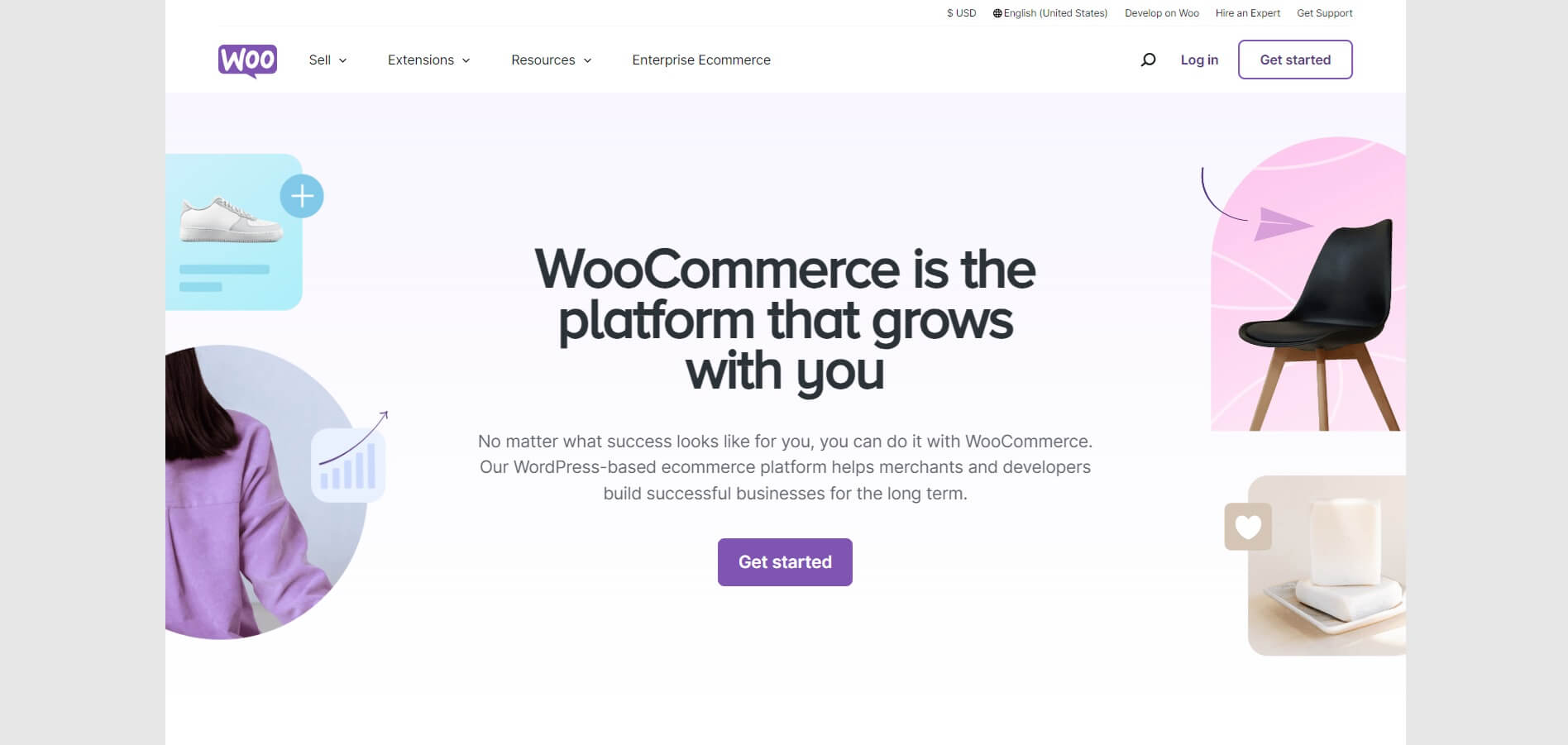
As one of the top choices for Sylius vs Magento alternatives, WooCommerce is an open-source plugin on WordPress that supports the design of eCommerce or sales websites. Its task is to turn the website into a fast and effective eCommerce site.
WooCommerce has all the functions that a sales website needs, such as order cart, quantity of goods, payment, promotions, customer registration, etc.
Currently, there are about 13 million people using WooCommerce for their websites and about 37% of online shops operate based on this plugin. The reason for this popularity is because compared to Shopify or Magento, this platform is completely free and the installation and use method is relatively simple and easy.
You don’t need to be a professional technician to do it with the help of a diverse WordPress template library, helping the process of building an online shop home page quickly with just a few steps. In addition, WooCommerce is regularly updated with new features and supported by WordPress developers to ensure high security, helping to protect data and transaction information safely, and preventing any Illegal intrusions imported by third parties.
If you are wondering which open-source platform to choose to start your store, read more at: Magento vs WooCommerce
BigCommerce
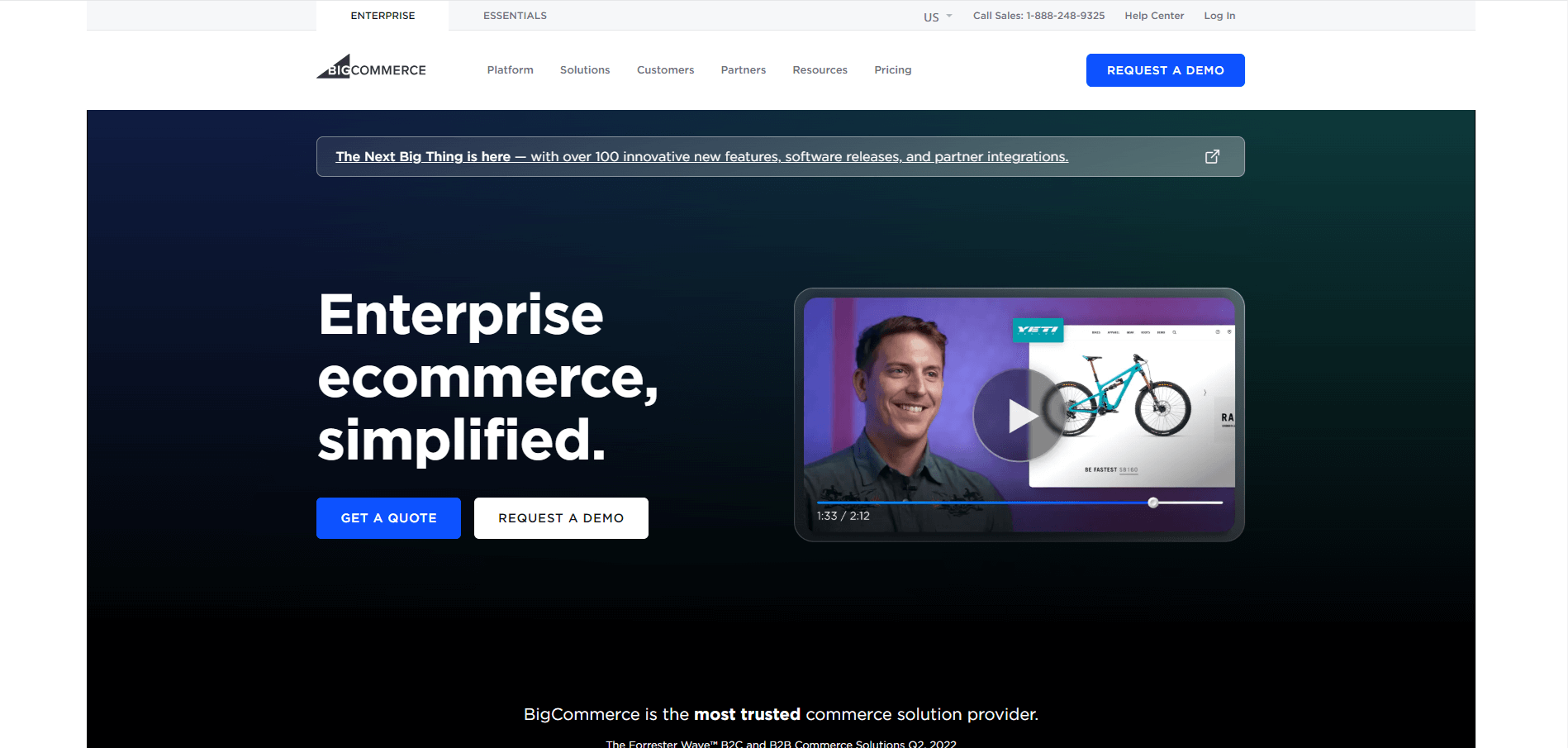
BigCommerce is one of the most popular eCommerce website-building support platforms today because of its flexibility, user-friendliness, reasonable cost, and series of built-in tools and features that meet the needs of businesses of all sizes.
When comparing BigCommerce vs Magento 2, this platform is designed to be user-friendly for both technical and non-technical users. The platform provides a variety of themes for businesses to quickly build websites and provides many tools to conduct promotional campaigns.
In addition, customers also appreciate BigCommerce’s ability to provide a series of necessary features and tools built into solution packages. Using BigCommerce, businesses save a lot of costs such as hosting, maintenance, updates, and security. No matter what solution package a business chooses, this platform does not charge transaction fees, provides unlimited bandwidth, and file storage, and allows the creation of unlimited employee accounts for free.
WordPress
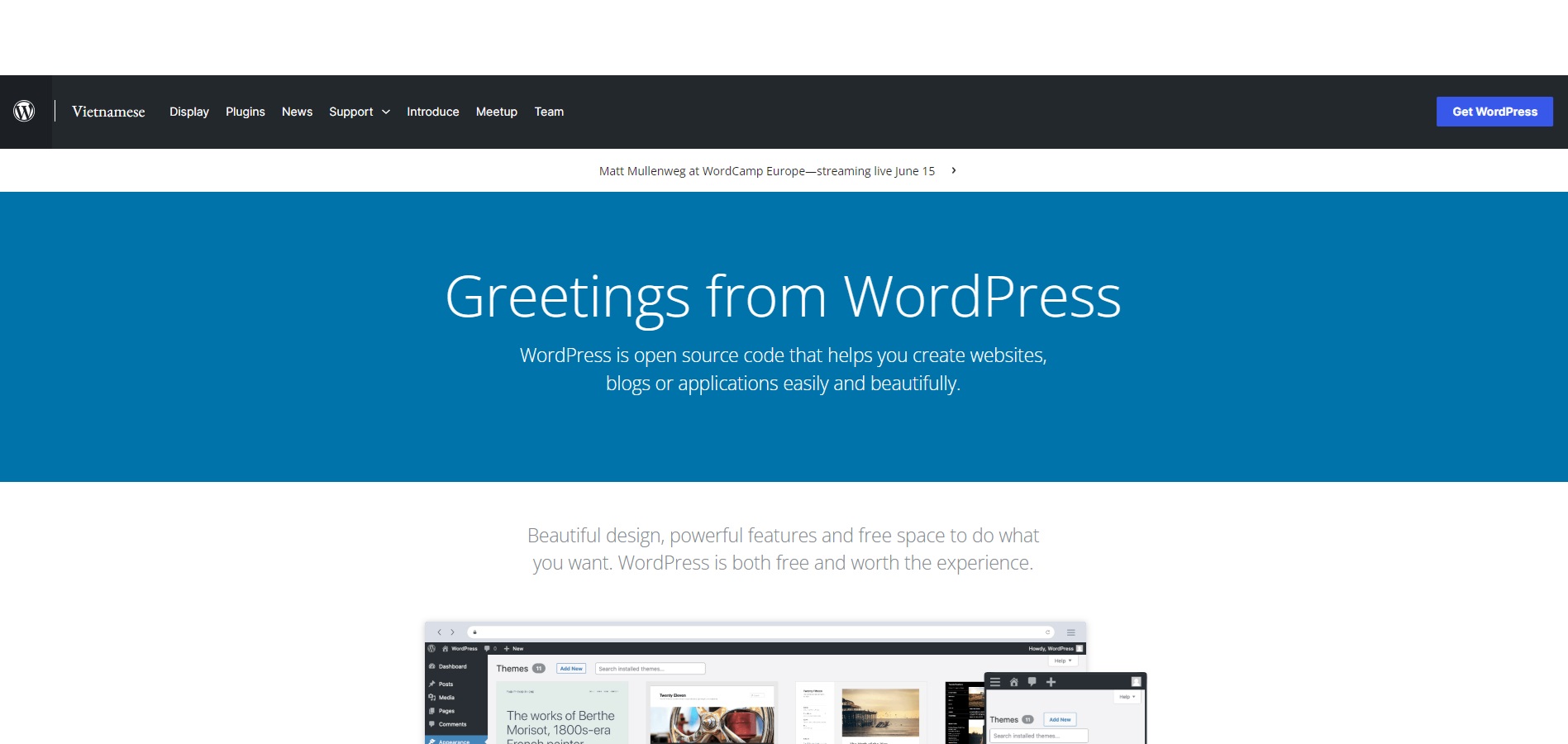
WordPress is an open-source platform for publishing webpages and blogs created with the PHP programming language and MySQL database management system.
WordPress’s user-friendliness attracts users. Users don’t need to have advanced programming skills to utilize WordPress because it is incredibly straightforward to use, comprehend, and operate.
Not to add, WordPress has a simple administration system with all components – including settings, interface, and article posting – organized in a clear, rational, and user-friendly way. In addition, with 52 supported languages, including Vietnamese, WordPress is the most multilingual platform.
Another advantage of this platform that cannot be ignored is the large and quality user community. You can learn WordPress tips and tricks from others on the Internet.
Final Thoughts
Both Magento vs Sylius are effective and suitable for many types of projects. When choosing an eCommerce platform, we will need to consider many factors, such as project scale, project type, scope of requirements, future development level, budget, and business expectations.
By carefully evaluating these factors, you’ll be well-equipped to choose the ideal platform that propels your business forward in the dynamic world of eCommerce.
If you are still struggling with your store, seek help from professional consultants like BSS Commerce to save your business.
With a professional team recognized by Magento, BSS Commerce not only supports building stores on a single eCommerce platform,. What’s more, we will assist you in choosing the right platform for your needs. We will then work closely with you to implement and optimize your store, ensuring a successful eCommerce launch. Our mission lies in your success.

